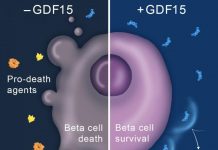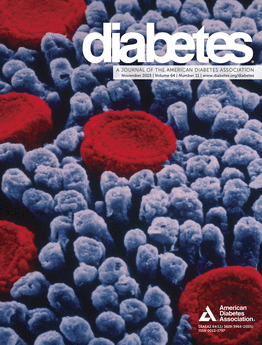BOSTON -- The landmark Diabetes Control and Complications Trial (DCCT) funded by the National Institutes of Health, which followed 1,441 people with type 1 diabetes for a decade until 1993, showed conclusively that tight blood glucose control significantly reduces the risk of developing complications of diabetes such as eye, kidney and nerve disease. But the DCCT also showed that tight control -- achieved by taking three or more insulin injections daily -- can come at a cost: Patients in the trial who kept their blood glucose levels as close to the normal range as possible were three times as likely to suffer episodes of severe hypoglycemia -- abnormally low blood glucose levels that can cause confusion, irrational behavior, convulsions and unconsciousness. This finding raised the fear that, although tight control may lower the risk of developing other diabetes complications, it might also lead to a long-term loss of cognitive ability.
Now there is good news from Joslin Diabetes Center researchers in collaboration with investigators at the University of Pittsburgh Medical Center, George Washington University and the DCCT/EDIC Research Group. After following three-quarters of the original DCCT participants for an additional 6.5 years, the researchers found no link between multiple severe hypoglycemic reactions and impaired cognitive function in people with type 1 diabetes in the study. "This study provides further support for the safety of intensive diabetes therapy and the benefits of maintaining good glycemic control," says the study's principal investigator, Alan M. Jacobson, M.D., head of Joslin's Behavioral and Mental Health Research Section and Professor of Psychiatry at Harvard Medical School. "While acute episodes of hypoglycemia can impair thinking and can even be life-threatening, patients with type 1 diabetes do not have to worry that such episodes will impair their long-term abilities to perceive, reason and remember."
The study is among approximately 80 presentations that Joslin scientists will deliver at the American Diabetes Association's 66th Annual Scientific Sessions being held at the Washington Convention Center in Washington, D.C, from Friday, June 9, through Tuesday, June 13. More than 15,000 scientists, physicians and other healthcare professionals from around the world will attend the conference. The study will be presented during a presentation of Late Breaking Clinical Studies on Monday, June 12, 4:30-6:30 p.m. in the Washington Convention Center, Hall D. [Abstract Number 750232: "Effects of Intensive and Conventional Treatment on Cognitive Function Twelve Years after the Completion of the Diabetes Control and Complications Trial (DCCT)"]
To determine whether tight control has long-term adverse effects on cognitive function, the researchers examined 1,059 participants in the original DCCT trial: 537 patients receiving intensive therapy with either an insulin pump or three or more daily insulin injections; and 522 patients receiving conventional therapy of one or two injections daily. For the period of this study, 652 patients reported no hypoglycemic (low blood glucose) events resulting in coma or seizure; 348 reported from one to five events; and 59 patients reported more than five.
All of the patients were evaluated using the same neuropsychological tests that researchers administered during the DCCT trial, tools that analyzed abilities in eight cognitive domains: problem solving, learning, immediate memory, delayed recall, spatial information, attention, psychomotor efficiency and motor speed. Adjusting for age, sex, years of education, length of follow-up, and the number of cognitive tests taken, the researchers found no change in any of the eight areas. Higher A1C readings among patients -- which indicate less, not tighter, control -- were associated with a modest decline in motor speed and psychomotor efficiency, but no other cognitive domain was affected.
Continue Reading Below ↓↓↓
"This is very good news for patients with type 1 diabetes," says Dr. Jacobson. "Severe hypoglycemia can still be a very dangerous condition. But with proper education, self-care and close medical follow-up, the risk of severe hypoglycemia can be lessened. Now we know that patients don't have to worry about damaging their mental abilities as they work to significantly decrease their risks of developing diabetic retinopathy, neuropathy, nephropathy and cardiovascular disease."
Type 1 (insulin-dependent) diabetes accounts for between 5 and 10 percent (between 700 thousand and 1.4 million people) of all cases of diabetes diagnosed in the United States. In this form of diabetes, an autoimmune process has destroyed the insulin-producing islet cells in the pancreas, so patients must inject insulin daily to survive. Type 1 can strike people at any age. In type 2 diabetes, the far more common form of the disease, patients can generally produce some of their own insulin. However, many need insulin or oral medications that can put them at risk of hypoglycemia.
The Epidemiology of Diabetes Interventions and Complications Study (EDIC), a follow-up study of DCCT participants, is examining the long-term effects of conventional vs. intensive diabetes treatment on the development and progression of diabetic complications. "The DCCT was the world's first major clinical trial in type 1 diabetes. Today, more than 20 years after it was launched, it continues to provide invaluable insights regarding the importance of intensive glucose control in type 1 diabetes," said Catherine Cowie, Ph.D., of the National Institute of Diabetes and Digestive and Kidney Diseases, the part of the NIH that sponsored the study. Joslin is one of 28 clinical centers around the country participating in EDIC.
Collaborating with Dr. Jacobson in this study were Christopher M. Ryan, Ph.D., of the University of Pittsburgh School of Medicine; Patricia A. Cleary, M.S., and Barbara Waberski, M.S., of George Washington University's Biostatistics Center; Amanda Burwood and Katie Weinger, Ed.D., R.N., of Joslin; Meg Bayless, R.N., of the University of Iowa; William Dahms, M.D., of Case Western Reserve University; Nancy Silvers, R.N., of the University of Pittsburgh Medical Center; and Judy Harth, R.N., of The University of Western Ontario.
The study was supported by grants from the National Institutes of Health and Joslin Diabetes Center.
Source: Joslin Diabetes Center










